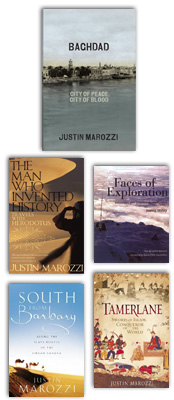Patrick Hennessey was one of the British army’s self-proclaimed Bright Young Things, an Oxford graduate with a lust for combat and a literary bent. Born in 1982, he belongs to a generation of uniformed men and women who would, as he puts it, ‘do more and see more in five years than our fathers and uncles had packed into twenty-two on manoeuvres in Germany and rioting in Ulster’. Hard on the older generation, perhaps, but such have been the opportunities afforded by the War on Terror.
The Junior Officers’ Reading Club charts Hennessey’s four-year journey from the square-bashing of Sandhurst to front-line duty in Iraq and Afghanistan as a Grenadier Guards Platoon Commander and Operations Officer, and his subsequent departure from the army. If the journey itself is unremarkable — the usual suspects of barking Non-Commissioned Officers, a general disdain for Rear Echelon Motherfuckers or REMFs, high-octane thrills of men with guns and the camaraderie forged under fire are all present and correct — what impresses is the sheer candour and immediacy of his reporting. A literary soldier, especially one still in his twenties rather than a bewhiskered sixtysomething general penning his memoirs, is something to be treasured.
We can therefore excuse the gung-ho tone of much of the book. This is a young man fortunate enough, unlike so many soldiers of a previous generation who missed out on a good war, to be doing just what he has always dreamed of. During one particularly intense fight with ‘Terence’ Taliban in Afghanistan, he says he wants to sit down with the Major who has come along for the ride and try to understand the adrenaline and euphoria of it all and ask what could possibly compare.
‘…the winning goal scoring punch, the first kiss, the triumphant knicker-peeling moment? Nowhere else sells bliss like this, surely? Not in freefall jumps or crisp blue waves, not on dance floors in pills or white lines — I want to discuss with him whether it’s sexually charged because it’s the ultimate affirmation of being alive…’
The answer is very little or nothing can compare because war is uniquely different. It confers an experience that those who have not donned uniform can ever quite understand. As the Company Sergeant Major puts it in a dash of graffiti at the Sangin District Centre when the tour comes to an end, ‘for those who have fought for it, life will always have a flavour the sheltered cannot taste’.
Hennessey’s generation is naturally the most media-savvy there has ever been. The Inkerman Company’s exploits are scrupulously and tirelessly recorded on camera so the officers and men can make video montages to impress friends and girlfriends back home.
‘We went into battle in bandanas and shades with Penguin Classics in our webbing, sketch pads in our daysacks and iPods on the radio, thinking we knew better than what had gone before,’ he writes. Hennessey is driven by the glamour of it all, from Sandhurst to Iraq and into deployment in Afghanistan. After the tedium of all that drill, the relentless boredom of waiting and hoping for action which is the soldier’s lot, killing the enemy is ‘fun’, never mind the rights and wrongs of the conflict,
which are not discussed.
There is an inevitability about the reality-check which comes of seeing comrades killed and grotesquely injured. Casualties become shockingly regular. We don’t know whether Hennessey’s virtual reading club included Herodotus, history’s first war reporter, but the irrepressible Greek put his finger on it in lines that ring as true today as when he wrote them 2,500 years ago: ‘No one is fool enough to choose war instead of peace — in peace sons bury fathers, but in war fathers bury sons.’
As Hennessey contemplates the carnage around him, the tone becomes darker, more measured and reflective, a welcome and sensitive contrast to the flippant banter, dripping with irony, that has come before. These passages are some of the most important and affecting in what ultimately proves to be a very fine book, a powerful despatch from the front line and required reading for the families of those in the armed forces. Let us hope his move into conflict and international humanitarian law will provide material for future books because he would be an amusing, probably caustic, observer of the field.
A final note. When I called the Panorama producer Hennessey accuses of being a little yellow under fire in Afghanistan to check the author’s version of events, he disputed them with a chuckle. He also described Hennessey as the bravest man he had ever met.

